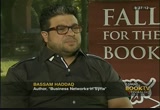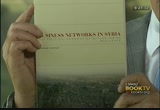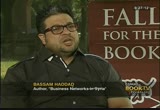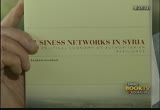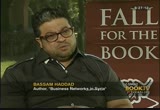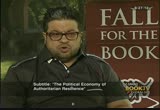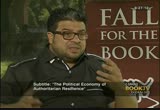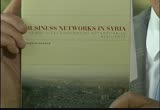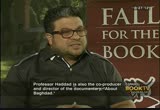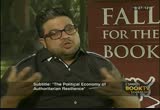tv Book TV CSPAN October 28, 2012 11:30pm-12:00am EDT
11:30 pm
[applause] [inaudible conversations] >> now we discuss the book "business networks in syria" and the current conflict in the country. this was recorded on the campus of george mason university in virginia, and it lasts about a half hour. >> host: you're watching booktv on c-span2 on the campus of george mason university in fairfax, virginia just outside of washington, d.c.. we're interviewing some of the professors here who also have books, and we're talking now with "business networks in syria" professor head of the
11:31 pm
middle eastern studies program here at george mason. professor, how would you describe syria's economy as far as its structure? >> guest: syria's economy went through a number of changes. it went from a centralized state hood economy to a mixed economy that involved centralized aspects and some market aspects, but not in the manner that actually allowed the market to be efficient at all. >> host: when did this change occur from centralized to mixed? >> guest: most of the countries, the late developing countries, after the post colonial development, they had a period where they actually had to involve the masses in order to gain support and legitimacy. when this process, for a variety of reasons, began to create problems for the regimes and power and when external support and pressure for some of the regimes and for some of the directions that were available
11:32 pm
at the time in terms of moving towards the market economy around the 1980s took place, you saw a lot of these third world regimes or the global house begin to move from a state centered economy to a more market oriented economy, and the international financial institutions like the imf and world bank, played a role in doing so because they were literally place conditionalities on loans, and the conditionality involved into a market oriented economy. >> host: what role does an assad regime play? >> guest: the assad regime from the beginning, 1970, when the father, senior, gained power, he was intent on bringing in, actually, the business community into the fold, even if in an informal manner to
11:33 pm
actually have the economy, after some years of serious marginalization of the business community by the same regime under a different leadership. what syria or the regime ended up doing is the summit of the book which basically ended up selectively networks with big business in such a manner that allows this state business relationship to mature and develop from the 1970s to the 1980s and eventually hijack the economy in the 1990s in what we call the business networks or cloning networks. >> host: now, who did the hijacking? >> guest: the state business relations, basically amounted to networks that ended up controlling the commanding height of the economy. of course, the state had the more strategic assets within its possession, but a lot of big business, individual business that are quote-on-quote,
11:34 pm
private" became players in the 1990s and 2000. >> host: what are some of the businesses that we're talking about that are part of the networks? >> guest: basically anything that involved big business whether it's earlier on manufacturing in the 1980s and 1990s and commercial ventures such as car dealerships and so on, but the manufacturing included everything from pharmaceuticals to ceramics to textiles. in 2000s, this became a telecom industry, free trade zones, things that bring in a lot of money with a high profit money that was siphoned off by big business networks leaving a majority of syria in worse conditions than they were because the regime, that is, ended up quote on quote saving the economy on subsidies that most people relied.
11:35 pm
that took place for 10-15 years, and ended up in in 2010 and 2011 producing the kind of resentment and discontent that fed the uprising. >> host: so, professor haddad, who was getting the money, the profits in these business networks? >> guest: the profits went to the individuals within these networks. the people that are involved in the networks included state officials. this would be public sector managers, government employees at high levels, ministers, the prime minister usually was basically the left, if you will, of a lot of the networks, and, of course, folks high up in the regime like the royal family. the point is that these networks or the point of the book is that these state business networks exist in every society, even in the united states, and they are usually, usually, not always, but usually corrupt and problematic, and they siphon off a lot of money, however, in some
11:36 pm
countries, there's checks and balances placed on the networks, much more so than others. in a place like syria, these checks and balances were not sufficient to check the networks anywhere in the world to prevent them from running into the ground. >> host: can you give us an example, the network of the u.s., how it exists? >> guest: after the invasion of iraq, one of the major construction or reconstruction quote-on-quote ventures was, you know, commissioned somehow or given somehow to various corporations that are very much in touch or close to or part of the network, for instance, vice president dick cheney, whether it's haliburton, other countries, ended up unfairly taking up the ventures, and, actually, they didn't do a good job at all as a virtue of the
11:37 pm
results we saw years later. they ended on scandals, and other kinds of such networks. if you'd like to look at a much bigger scale, the entire $700 billion to $800 billion bailout is a quote-on-quote state business network that operates allowing our system to bail out people who caused a problem under legal pretense. the issue is in countries like syria, money is smaller, and the checks and balances whether it's the media or the democratic process, which is absent, and other civil society associations and power centers is completely absent so the price smaller, it's divided in an even much more inequateble way pushing people to the streets, leaving more democratic countries where
11:38 pm
these things happen, but there is a threshold, economic, and some democratic mechanism kicks in at a certain point. though, it's important not to think these things only occur in the third world. >> host: professor haddad, what about the globalization of the syria economy? if a marriot wants to open in damascus, is it just purely private or a state role in all of that? >> guest: it's actually been quite close until the late 1980s. after the 1990s, early 1990s, you saw such ventures open up. places like syria, you can open up such ventures, and they are in existence today, and actually proliferate, but a lot of these ventures are carefully selected opposed to countries like egypt and tunisia, the syria regime is careful to limit northern direct investment in way, shape, or form. you find mercedes, four seasons
11:39 pm
hotels and so on, you find them, but in smaller numbers always connected to some sort of deal whereby the government has some criminal, if not over the ownership of the department, but the usage rights. >> host: so how has the government made this system inefficient? what has caused the inefficiencies? >> guest: the inefficiencies really are a function of how economic decisions were made based on the interest of network members rather than on a broader economic strategy that charted a future for the country based on its resources, endowments, human, and other resources, and in the end you had what i call this circumliberallization process where the benefits of the liberalization process were siphoned off by networks opposed to being spread out into society, and in the end, these
11:40 pm
tailored policies became so ram participant they started -- rampant, they started to produce outcomes, and you had the ability to monopolize the sale of jeans or bananas for instance. you are given privileges and distinctions allowing you to set prices, and that ends up reducing competition, include increasing the profit margin of those connected given that much of the support went into commercial and trade ventures, not into manufacturing and labor intensive ventures so you had an effect of increasing unemployment and increasing the profit margins on a very small number of people at the same time. that risk was exacerbated by the decline of subsidies and the rural areas outside the two main
11:41 pm
metropolitan cities. >> host: professor haddad, who are the players we have not heard of, large business leaders in syria, and what role are they playing in the current crisis in syria? >> guest: well, you know, the current crisis in syria probably has a different trajectory at some level, especially after the first few months. it became a different kind of thing. it started out as resentment and rebellion -- >> host: economic resentment? >> guest: it was mixed. it's really problematic to look at the arab uprisings and pin it down on one thing because we're talking about several decades of a particular kind of system that was politically inefficient and definitely undemocratic. there was economically efficient very early on, but then actually declined and became quite problematic in terms of the gaps between the haves and the have-notes, but all -- have-nots, but all of this
11:42 pm
combines for a reason to act, in the regime, people calculate irrational and don't act unless there's a positive outcome. when that took place, when that movement took place in tunisia and egypt, syria became more emboldened compared to years before, and the economic issues played a major role in the beginning, especially as huge tycoons, a cousin of the president, was considered basically the symbol of the economic dimensions of the uprisings because he siphoned off all controls as many of us assume, a good portion of the new private economy, and that was also by design. these kind of -- this kind of -- not -- this kind of transgression caused many people to feel, in a country that's supposedly socialist still by
11:43 pm
constitution, to feel that the system has basically -- is completely broken, and the economic dimensions, coupled with the facet that there are no avenues for dissent in syria that are legitimate, coupled with the increase in the declining, well, the declining of subsidies, created a situation of hopelessness in many parts of the syria, not all parts which explains why syria has prolonged uprising opposed to the other countries. i mean, there is -- there was something about the syria system economic system and social system that provided a bit more stability; however, the -- what we call the domino effect instigated the uprisings early on, and it took awhile for the entire country to be engulfed in this process because the metropolitan cities had better infrastructure, high standard o living, and we're not just ready
11:44 pm
to go to the streets even if they are not happy with the regime. >> host: published by stanford, business networks in syria written by haddad, head of the middle eastern studies program here at george mason university. is there a black market in syria? >> guest: are you -- are you looking to invest? right now, there's no market in syria at this point. beforehand, absolutely. one of the ways the networks, which is a good part of the book, one of the ways the networks actually accumulated so much capital in the 70s and 80s is through the black market and through illegal trade because power cren cores and individuals could actually enforce transgressions so to speak and allowed for this kind of market
11:45 pm
to grow almost indefinitely creating new kinds of social groups that were beholdent to the states which is why the networks were solid for two decades. it took awhile before the uprising actually began to break them down, and they didn't break them down at the highest levels, but the lowest levels when they thought the regime would not make it. business networks melted into society and supported the uprisings, even if in a quiet way. the black market and illegal trade and illegal smuggling -- well, smuggling basically created the sources that fed networks early on. after that period, the rule of law was applied a little bit more broadly and not necessarily for any other reason other than making sure there wouldn't be n new entrance to this kind ofw
11:46 pm
special club. >> host: in the western pressw during this crisis or uprising in syria, alepo was described as the commercial center of the country. why is that? tell us about that city. >> guest: for several hundred years, if not more, it was the meeting point between europe and asia and always developed a -- developed as a center of trade and commerce. that comet -- continued, of course, throughout the centuries throughout the 20th century and made it what it is in terms of its trade, in terms of its trade potential. now, also, it's a large city, not just a second city, it has been a place where many traders and manufacturers as well preferred either because it was historically quite vibrant or because it was far away from the
11:47 pm
center where they might have a bit more freedom, even though that margin of freedom was not wide. >> host: where are you from originally? >> guest: i'm lebanese, but my mother is syrian. >> host: lebanon is bordering syria; correct? >> guest: yes. >> host: lebanon's, how would you describe their economy? >> guest: well, it's going to take until saturday to cover this because the lebanese economy is really very difficult to describe. it's no , nominally -- nominally a liberal open economy, but the kinds of networks and crony networks that exist in lebanon turn this kind of seemingly open economy into vick victims -- victims, creating an environment where it's difficult to move up and young lebanese men and women
11:48 pm
leave the country to find jobs elsewhere whether it's in the gulf, europe, or the united states, and you see them in various places although the country's pretty small soçv' lebanese, the lebanese economy actually provided syria with a gate to the world in the 1980s, and that gate was a two-way gate so you will get the products that were not actually sold in the syria market officially through lebanon in the 1980s and provide goods to scrux later of the population, and the upper lay eric and then in the 1990s when the trades were more open, lebanon continued to be one of the ways that -- through which this took place, but in the 80s, lebanon and turkey were the two places where the illegal trades and smuggling allowed the black market to thrive and created a process of accumulation that literally created new stratas,
11:49 pm
now groups that created an interest in the stability of the regime. hence, when we talk about the syria regime, as brutal as it is, we also should not assume it was only violation that was basically causing the long term stability. it was also the support of the business groups as well as this distributive approach of the syrian states, the welfare policies that continued from the 60s, 70s, 80s, began down in the snows, and only recently did these distributed policies began to mean less and less to the point where people felt they are not getting what they want politically. economically, they are not getting what they want, and then the cutting of subsidies in the end on food and gas was the last straw for making many people in the syria -- in syria feel hopeless and those majorities existed as i said earlier, either in the countryside or the
11:50 pm
smaller cities more than in the main city, in the metropoll tan cities. >> host: does the military play a role in the economy? >> guest: the military in syria is not where the focus of power is. it's actually the security service branches that have come to dominate syria's sort of coercive structure, and this is where most power and authority lie, more than in the military. of course, the military is more than 300,000 strong, and powerful in that sense, but in terms of authority, and in terms of ability to act, even if limited, the syrian regem is different in that regard whereby the military does not have the command and control that will allow the military to come at any given point and tell the president, look, you've got to leave, you've got to, you know, we've got to deal with the crisis through this kind of, you
11:51 pm
know, arrangement whereby the head of the state leads and military distort the regime in some way. this is not possible in syria. the military does not have that power. those who have power are close to the presidency and distributed through the secret service branches more than a dozen of them, and these elements, socially and politically and economically are so organically intertwined with the regime that this kind of option or schism is really not possible. it might be in the future when there's an imminent collapse, but at this point, completely solid and organic, not allowing for these options. outsiders don't understand that didn't understand why the syrian regime is likely to hold on to power for quite sometime, and that's because schisms are not possible, and it looks like for a lot of the people inside the regime whether they support the top leadership or not, it looks like they know that the fall of the regime means also their fall
11:52 pm
so there is a rational calculation there that the entire ship will sink or swim, and there's no options for schisms that allow for an exit so even if a group of people within the top syrian leadership actually wants to succeed or try to make a deal, they will not be considered legitimate because of their, you know, very high proximity to the reigns of power for decades whereas in egypt, the military had -- whether or not it participated in the brutality of the regime over four decades, which we actually, as a country, united states, supported for several decades, these guys have some atonmy, and they were able to make an argument to that the departure of the head of state is going to be meaningful. in syria, the departure of the head of state without the departure of the mechanisms is not meaningful. >> host: well, saying that, how do you see the uprising in
11:53 pm
syria playing out over x number of months and x number of years? >> guest: well, i'm hoping it's not x number of years because the death toll has surpassed 20,000-25,000, some say 40,000. you know, we cannot be sure. in either case, it's such a human tragedy taking place in syria where every time i want to address the situation, i'm -- i'm really not able to think about strategy and things of the sort because it's no longer about, you know, an uprising that's democratic against the regime. sure, the regime has been, but the uprising has become deluded, infiltrated, and is actually engaged in practices that the regime used to engage in, and that's why one of the reasons there is a stalemate today because the -- the opposition or many members of the opposition have actually lost the support from a good number of, you know,
11:54 pm
good percentage of the population as well as having included or continue to include elements from outside syria, not even syria, kind of like the iraq situation as we have seen in the past few months with the explosions and suicide bombings, a lot of this is external and internal. the places like qatar, saudi arabia, no interest in democracy, but have their own politics and interests in removing the regime, same with united states and europe as well as turkey. a lot of these countries had to own the human rights record and supporting opposition for al tier your motives is not jelling with people in the region because there is no belief that these countries actually are supportive of democracy because they are either not democratic, as in saudi arabia and qatar, or like the united states, they support authoritarian regimes for decades, and continue to
11:55 pm
support others who are not democratic. the push by all the countries, all of the countries is actually not in the legitimate push or a credible push. >> host: here in the u.s., we judge the economy by the unemployment rate, gdp, things like this. give us a snapshot of the current syria economy. >> guest: the current syrian economy cannot be actually accessed. i mean, the numbers are just not there. even from the beginning, the syrian economy was not as trarns parent as one would have looked as a researcher. earlier on, the syrian economy was based on agriculture industry, manufacturing, and a modest oil sector where about 60%-65% of the foreign exchange in syria came from oil sales because of the ability to actually make use of its 300,000-500,000 barrels of oil a
11:56 pm
day that's produced, but it was mainly an economy that rested on these pillars, and with time after the 1990s, it rested on increase in trades, increase in telecom type industries, but it's really never reaching the points where it's capitalized on its early development of industry in the 60s and 70s especially. in other words, a lot of this potential, again, was -- fell victim to cloney networks involved in -- cellularcrony networks, a regimg to consolidate power, and sometimes the more inefficient routes basically secure power than the efficient ones, and we also have to recognize that the countries like syria doesn't exist in the most, you know, serene and safe neighborhoods in the world, but it exists in a volatile neighborhood with powerful and aggressive and
11:57 pm
brutal actors around this including israel, including some of the other countries that have been in the region for decades so you have also a dimension that is usually not taken into account because it's invisible in a way because we're looking at syria internally, but, actually, there are reasons why, for instance, the syrian regime would invest way too much in its military as opposed to another area, and that's not just to protects the country, of course, but to protect itself, but it's also important, not to discount the regional and international context within which countries like syria exist, and this is what explains the stalemate, the syrian situation is more than the syrian situation, but about the israeli-arab conflict. it's about the iran-syria access opposed to the iran -- sorry, kuwait, qatar saudi arabia access, and it's also really about china -- i was going to say the soviet union -- but
11:58 pm
china, russia on one hand and the united states and europe on the other. you have three levels of stalemates, local, regional, and international because there's so much at stake so a country like or regime like syria for the past 40 years had these calculations in mind so this is not to excuse the regime's brutality whatsoever, but to understand analytically that the outcomes of what we have been witnessing for the past several decades involve these kinds of calculations that many of us don't take intoing the. >> host: and we have been talking with professor haddad, the political economy of the authoritarian resilience, published by stanford. he's head of the middle eastern studies program here at george mason university. this is booktv on c-span2. visit booktv.org to watch any of the programs you see here online. type author or book title in the
11:59 pm
search bar on the upper left side of the page and click "search," and you can share anything you see on booktv.org easily by clicking "share" on the upper left side of the page and selecting the format. booktv streams live online for 48 hours every weekend with top nonfiction books and authors. booktv.org. here's a look at books published this week: ..
221 Views
IN COLLECTIONS
CSPAN2 Television Archive
Television Archive  Television Archive News Search Service
Television Archive News Search Service 
Uploaded by TV Archive on

 Live Music Archive
Live Music Archive Librivox Free Audio
Librivox Free Audio Metropolitan Museum
Metropolitan Museum Cleveland Museum of Art
Cleveland Museum of Art Internet Arcade
Internet Arcade Console Living Room
Console Living Room Books to Borrow
Books to Borrow Open Library
Open Library TV News
TV News Understanding 9/11
Understanding 9/11


